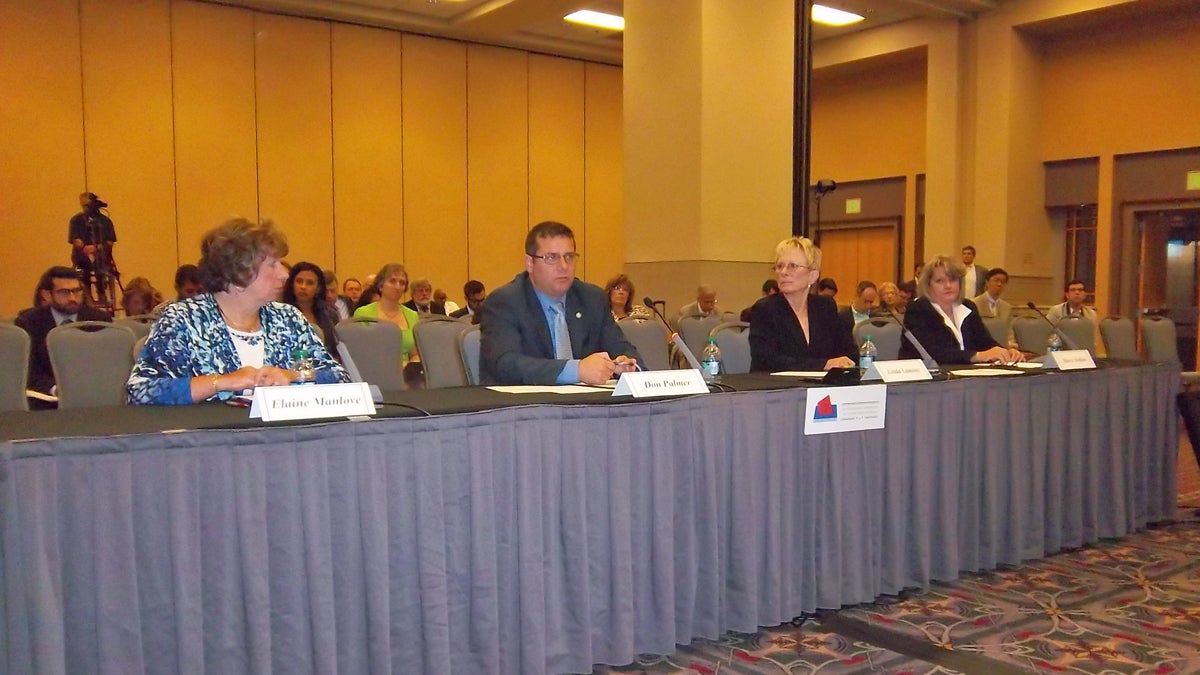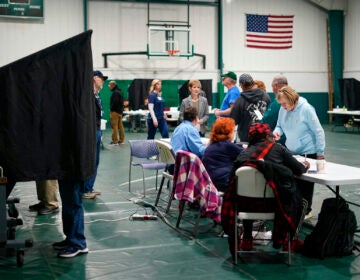Presidential panel meets in Philly as part of effort to improve voting experience

Delaware elections chief Elaine Manlove (left) and officials from three other states testify before the Presidential Commission on Election Administration. (Dave Davies/WHYY)
A presidential commission aimed at cutting long lines at polling places and improving the voting experience held a hearing in Philadelphia Wednesday, the third of four planned across the country.
President Barack Obama appointed the Presidential Commission on Election Administration after long lines plagued some polling places last November.
The commission’s research director, Nathaniel Persily of the Stanford Law School, said voting problems in America aren’t widespread, but there’s room for improvement.
“While most people don’t end up waiting on long lines on Election Day, three or four million people do, and when three or four million people are waiting for over an hour on Election Day, that’s a problem,” Persily said at the Pennsylvania Convention Center, where the hearing was held.
The 11-member panel heard from a variety of state and local election officials, as well as members of the public.
Though he’s regarded as a national expert on elections, Persily said the hearings have identified a problem that wasn’t on his radar: School officials wary of having strange adults in their buildings after last year’s Sandy Hook shootings are telling election officials they can no longer use schools as polling places.
“And schools are often the best polling places because they’re ADA accessible — those with disabilities can vote there,” Persily said. “They have large auditoriums. They’re less likely to pose problems that private business areas are going to pose as polling places. And so the closing of schools is really causing a crisis in a lot of areas.”
Delaware election commissioner Elaine Manlove told the commission eight schools in her state are out of the elections business.
She asked state legislators to impose a solution: Make the state’s primary election day an “in-service day” for teachers, so they can have voters in the building when students are home. There’s been resistance, she thinks, because an in-service day in the middle of the week isn’t so appealing.
“I’m giving them a Tuesday, and they’re looking for a Monday or a Friday,” Manlove said. “Outside of that, I can’t find a reason why they would want to have all these voters come into the school while the children are there.”
Manlove said she couldn’t get her proposal to a vote in the last legislative session. She’ll try again.
Virginia’s elections chief, Don Palmer, said he’s excited about new computer software designed to monitor turnout at every polling place on Election Day and detect problems as they develop..
“They’re able to predict that a line may be forming based on the turnout that they have, and they’d be able to use additional resources, send additional poll workers,” he said.
Another issue in future elections, Persily said, is cutbacks in the postal service as more people use mail-in ballots. The commission will make recommendations to Obama when it’s finished its work.
WHYY is your source for fact-based, in-depth journalism and information. As a nonprofit organization, we rely on financial support from readers like you. Please give today.




